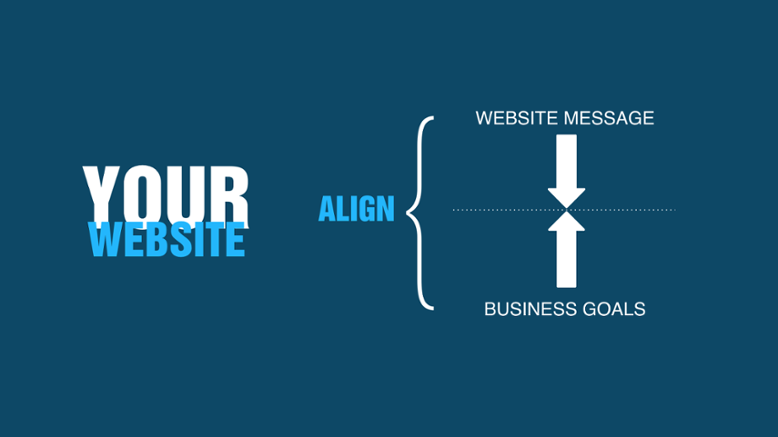Are Your Online Goals Aligned With Your Business Goals?

Inbound Marketing on a Small Business Budget
January 31, 2016
8 Things to Consider When Updating Your Website
March 1, 2016Over the past 18 years, we've built hundreds of websites and implemented almost as many marketing campaigns. And in that time, our thinking on what makes an effective website has changed several times.

Today, your website should be more than just an online advertising tool. It is the central hub of your business presence.
But even businesses that realize this fact often misunderstand its meaning. Too often, they treat the website as a catch-all for the entire business. The marketing department, sales team, IT support, HR, recruiting, and operations all take advantage of its features to serve their needs.
 How Most Businesses Use Their Website
How Most Businesses Use Their Website
Time and again, we see websites that are focused inward on the company. Their message focuses on look at me, look at my services, or look at how good I am. But through this inward focus, they ignore the problems that potential customers are trying to solve.
Without exception, this inversion of focus will hinder your website's performance. Communication becomes a one-way street, and your business becomes the annoying friend that never asks how you are doing because they are so busy talking about themselves.
Your website can be summed up in one word: rude. It rarely, if ever, actually tries to answer the questions a potential customer might be asking.
The reason for this inward focus is relatively simple. Marketers who take this approach assume that if they build a website saying look at my widget, audiences will somehow feel an instinctive need to buy the widget.
But reality doesn't work like that. People become customers because they seek to gain a very specific benefit from your product or service.
 What Your Website Should Do Instead
What Your Website Should Do Instead
So stop being so darn vain.
Allow your business goals to drive your website, by asking a simple questions: "What are my business goals?" and "Are my business goals represented appropriately on my website?" It's a sad fact that most businesses don't make the corelation between their their website and their business goals.
Let's role play for a minute. As a business owner, I know both my revenue sources and current mix of services.
I know this about my revenue during 2015:
- 32% came from Programming
- 18% came from Content Development
- 15% came from Social Media Management
- 10% came from Design
- 8% came from Search Optimization
- 7% came from PPC Management
- 4% came from Video production.
That tells me where my business stands today, as a snapshot in time.
But...
iIt's also important to consider the fact that some of the above services are more profitable than others, and that some of them are in decline while others are growing. In 2014, for example, content development was 3% of my revenue. In 2015, grew to 18%. And for the coming year, my business goals will be different than they were in 2015.
Naturally, if I want to grow a certain area of my business, I need to focus my marketing efforts there. To maximize my success, I want to focus more on certain services that are both in higher demand and more profitable. And that means my business goals need to be reflected on my website.
For me as for most businesses, the website is the very first touch point with a potential customer. It tells them my area of focus, and how I can help solve their needs. If I want content marketing to be 50% of my business, then my website, marketing messages, social media, ebooks, search optimization, and the screen real-estate on my website should all have a heavy focus on this service.
By reviewing my business goals in the context of my web presence, I create the opportunity to grow in the areas of the business I want. And by updating my website, changing my message, and allocating more screen real estate to the future focus of my business, I am aligning my business goals with my website.
Lessons Learned
After 18 years of experience in web development and digital marketing, we strongly believe that the single BEST practice when leveraging your website is to align it with your business goals.
That means your marketing goals should drive your website UX. It means your business objected should be reflected in what you communicate online. And it also means that your screen real estate should be representative of your goals.
Do your business goals and online goals align? If not, it may be time for a marketing consultation. Contact us to start the conversation and ensure that your business moves from a vanity project to a marketing and business powerhouse.

Carl could be considered the nucleus from which everything happens. He has 25 years of knowledge stuck inside his head just waiting to come out.